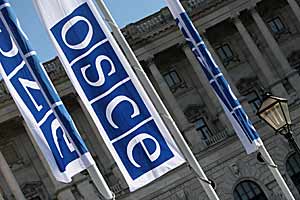
OSCE Avoids the Hard Issues at Year-End Conference
Publication: Eurasia Daily Monitor Volume: 5 Issue: 231
By:

In common with all OSCE chairmanships since 2003 (when Russian veto power mauled the organization irreparably during the Dutch chairmanship), Finland set itself a minimal task in 2008: to ensure institutional survival by deferring to Russia in Europe’s East and hosting a “successful” year-end conference, before passing the baton to the next chairmanship. Russia’s invasion of Georgia has, however, disrupted this minimalist strategy.
The measure of year-end “success” since 2003 has become the adoption of a final political declaration by consensus, almost as a goal in itself. This goal has, however, eluded the last five chairmanships. Their draft documents either did not concede enough on security issues to earn Russian acceptance or conceded too much to be acceptable to other participant countries.
The Finnish chairmanship has apparently tried to circumvent this dilemma by drafting the blandest possible final political declaration (OSCE Chairmanship, “Renewing the Spirit of Helsinki,” draft ministerial declaration, December 3).
Unlike the drafts in past years, which at least attempted to identify problems and solutions (only to shatter against Russian vetoes), this year’s draft of the final political declaration steers clear of security issues in Europe’s East, attempting even to close its eyes to the most pressing issues. It proclaims at the outset that the “Helsinki Final Act [of 1975] remains the foundation of our work” and touts the host city as the “birthplace of the Helsinki process,” anticipating the Russian-desired summit on “pan-European security” to be held there soon.
From this (and subsequent) wording no one would guess that Russia had dismembered Georgia only three months ago in violation of the Helsinki Final Act’s core principle: no changes of borders through the use of force and without the consent of all parties involved. Regarding this and other unresolved post-Soviet conflicts, the document calls for “negotiated settlement[s] in accordance with OSCE principles,” but fails to name them. Other countries are attempting at the last moment to introduce references to the principle of territorial integrity and sovereignty within internationally recognized borders, which is also a core tenet of the Helsinki Final Act and subsequent “process.”
Russia, however, claimed prior to this conference that it did “respect Georgia’s territorial integrity minus Abkhazia and South Ossetia,” as President Dmitry Medvedev declared in his joint news conference with French President Nicolas Sarkozy in Nice during the recent European Union-Russia summit (Interfax, November 14, 15). By the same token, Russia’s military and political control in Transnistria amounts to a forcible partition of Moldova, but the draft declaration avoids the problem, merely “encourag[ing] the parties to seek a peaceful resolution.” Under such circumstances, professing adherence to the Helsinki Final Act and “process” becomes meaningless without at the same time addressing the continuing breaches in Europe’s East.
The OSCE has been entrusted with a role in the South Ossetia conflict for nearly 15 years (while the United Nations handled the Abkhazia conflict in the informal division of labor among international organizations). Since the August invasion, however, Russia has blocked the OSCE’s access to South Ossetia. The year-end draft declaration would, if accepted by Moscow, “support a continued role for the OSCE in monitoring the ceasefire and working to restore confidence” as well as “strengthen the OSCE field presence throughout the affected areas.” The latter clause alludes to the goal of opening access for OSCE monitors there. Moscow, however, bars that access, hoping to force the OSCE to negotiate an agreement with the South Ossetian authorities for monitoring the area. Such an agreement could amount to indirect recognition of the secession.
Moscow is confronting the OSCE and UN with parallel dilemmas. Russia proposes an OSCE mission in South Ossetia and a UN mission in Abkhazia, each to be split from the two missions that have operated in Georgia thus far. Russia wants the two new missions to be mandated internationally and operate separately in the two territories, by agreement with the authorities there. These proposals are designed to confer international legitimacy on the territorial partition. The OSCE’s year-end conference does not seem to deal with this problem.
The organization’s chairman-in-office, Finnish Minister of Foreign Affairs Alexander Stubb, plans to travel to Moscow after the Helsinki conference for another attempt at reopening OSCE access to South Ossetia. The Russians will almost certainly seek to limit that access to a symbolic minimum (as was the case prior to the August war) and stall for time until their troops clean up at least the most conspicuous traces of the eviction of Georgians from their villages.
In previous year-end conferences the OSCE had attempted (however feebly and unsuccessfully) to remind Russia of its commitments to withdraw military forces from Moldova and Georgia, in accordance with the Conventional Forces in Europe (CFE) treaty package. The OSCE is custodian of that treaty, which also sets quantitative ceilings on Russian forces in the “flank” areas. This year’s draft final document, however, is so vague as to lose its meaning: “We call on all state-parties to the CFE Treaty to implement their obligations and create conditions enabling all parties to ratify the adapted CFE Treaty and restore the viability of the [treaty] regime.” Russia’s unilateral suspension of its compliance with the treaty goes unmentioned.
Yet the “spirit of Helsinki” and attendant “process” are invoked as a basis for even grander security agreements with Russia. The final document would “take note of the recent initiatives of Presidents Sarkozy and Medvedev regarding the strengthening of security from Vancouver to Vladivostok. We consider the OSCE a natural forum to engage in exploratory talks. We are ready to consider the possibility of convening an OSCE summit in the near future.”
Moscow had insisted on such an endorsement in the final document (Permanent Council documents, November 17). The proposed conference and security agreements to come out of it would place the NATO, the European Union, and the United States on an equal footing with Russia and its Collective Security Treaty Organization, in a system intended to interfere with the existing, Western-led security arrangements.




